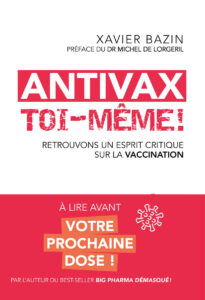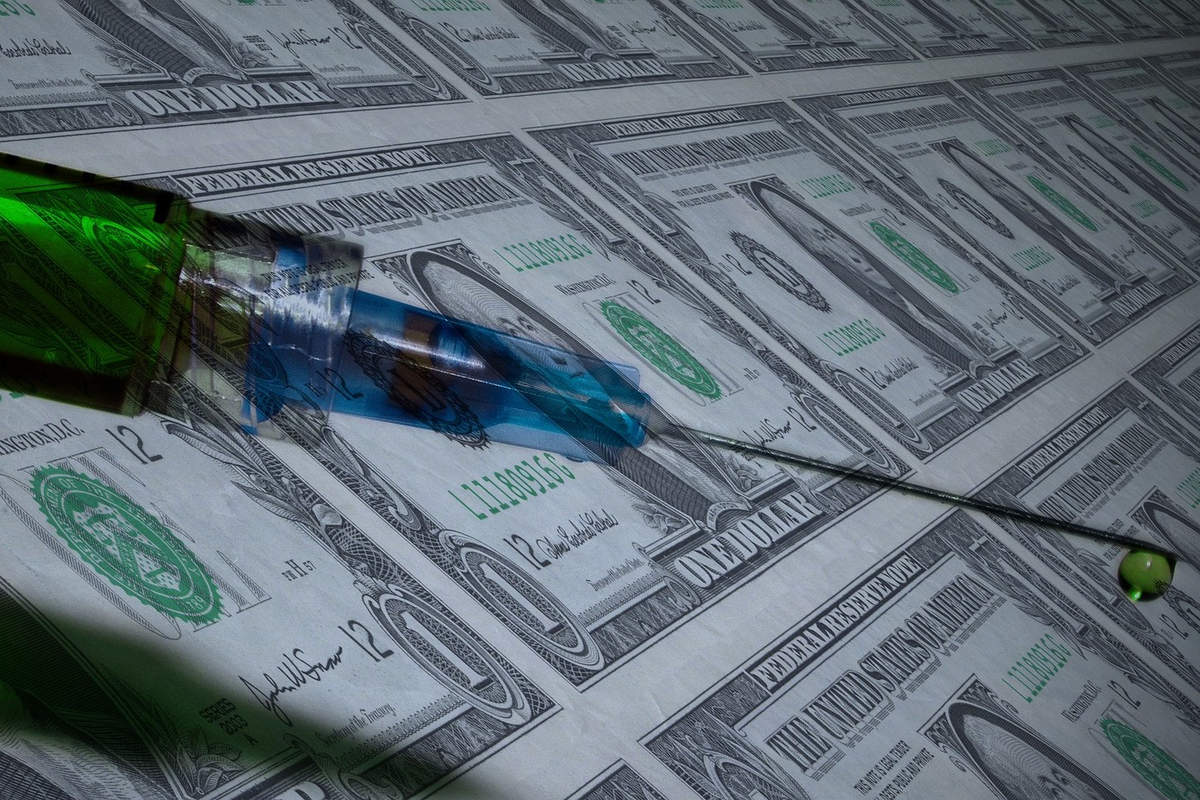In his book “Antivax toi-même!”, published by Guy Trédaniel, the scientific journalist Xavier Bazin shows how vaccines are not only a matter of medicine and science, but also of money, corruption and manipulation. Interview (part 2).
By Alix Jouan

Beyond what you call the vaccine religion and the belief in “lifesaving vaccines”, there is also big business in the vaccine race. Tell us how vaccines have become the golden goose of the pharmaceutical industry.
This has been especially prevalent over the past 30 years. Before, vaccines did not generate significant sales for the pharmaceutical companies. But in 1986, a law in the United States allowed vaccine manufacturers to no longer be sued in the event of adverse reactions; it is the State that pays. At the same time, the U.S. government began recommending childhood vaccines. This led to an explosion in the number of vaccines created. Technological changes have also made it possible to produce them more cost-effectively. The advantage of vaccines over drugs is that if they are recommended or mandated by a state, there is no need for advertising, the state promotes them. Moreover, they are not only aimed at people suffering from a disease, but also at the whole population as a preventive measure. A great market! Finally, it is very difficult to patent vaccines, given the complexity of their manufacture. You really have to be a big lab to have production lines with sufficient safety. This means that it is not “generalizable”. This is how vaccines have become, over time, a very significant growth driver for the laboratories that produce them.
Corrupt health authorities
So, we understand that it is very interesting for these laboratories to lobby the health authorities to recommend or make their vaccines mandatory…
Yes, there is also what is called systemic corruption, which can be conscious or unconscious, direct or indirect. In my book, I give a caricatural example, that of the former head of the FDA (Food and drug administration – the US drug agency, editor’s note), who resigned in 2019. A few months later, we find him on the board of directors of Pfizer with emoluments of about 300,000 dollars per year! We see that there is not even a need to corrupt the administration in a direct way. It is enough that anyone in a position to approve or not vaccines or drugs knows that, depending on their decisions, they can have a very lucrative career in the pharmaceutical industry afterwards. And the FDA is a major strategic target for laboratories, since its decisions are generally followed by other countries.
Bill Gates’ influence on the WHO
There is also the direct influence of Bill Gates on the World Health Organization through his Bill & Melinda Gates Foundation and another organization he created in 2000, Gavi – the Vaccine Alliance, which are the two biggest private funders of the WHO.
Bill Gates’ influence on the WHO is colossal. First, because he is its largest private contributor. Secondly, because private contributions, unlike those of member states, are earmarked. That is, they are directed towards the programs that these private contributors want to implement. And for Bill Gates, who obviously has a purely technological vision of health, these are vaccine programs to fight infectious diseases in the world. This creates a considerable bias in WHO policies, which in turn influence the health policies of states.
In France, the example of Cahuzac
What about our political leaders? Are they also corrupted or influenced in one way or another by the laboratories ?
It is difficult to know what exactly goes on behind the scenes, especially in the famous dinners of the presidents of the Republic with the pharmaceutical industries. We know that they exist, but they are not put on the agenda and there are no minutes, so we don’t know what comes out of them. On the other hand, the Cahuzac affair has revealed facts that can make us imagine what goes on in secret. Here’s a guy who was in charge of drugs at the Ministry of Health and who we learn by chance, years later, was taking bribes from medical device manufacturers. And as soon as he left the ministry, he became a consultant for Pfizer who paid him hundreds of thousands of euros. In my opinion, this is only the tip of the iceberg, but it gives an idea.
Communication and misinformation
You also discuss the decisive role played by communication and public relations agencies to not only advertise vaccines, but also to silence critics. You explore the case of Publicis in particular.
Publicis is one of the big advertising and public relations agencies of Big Pharma: it was the agency of Sanofi, then of GSK. It is also one of the three agencies chosen by the French government to carry out awareness campaigns on Covid and vaccination. But this same Publicis also finances an organization called NewsGuard, whose goal is to fight against “misinformation” on the Internet, by telling which site is reliable or not. And NewsGuard is cited as a reference by the press and the media. So we can see what’s going on: on the one hand, Publicis has the labs and the government as clients and does marketing-advertising to “flood the area”, as they say, with favorable arguments; and on the other hand, they finance an organization that dismisses and demonizes any media that would have contrary arguments. It’s quite effective.
Formatted media
Let’s talk about the mainstream media. As a whole, they are not very critical of vaccines, and this is even more true with Covid vaccines, not to mention the real omerta that reigns over adverse effects. How do you explain this uniformity in the press?
I think there is first of all a conformism to go along with the government for different reasons. But then again, there is the underground influence of public relations agencies which means that you wake up in the morning and all the media are talking about the same thing and in the same way. It is important to know that these agencies receive orders and pay journalists to write turnkey articles, totally oriented according to their clients’ interests. These articles are then sent to different media who publish them, often without changing a line. A journalist who worked for a long time for one of these agencies testifies to this in corona. It is edifying. The other major influence is that of the big press agencies such as AFP, Reuters, AP… who make the rain and the sun shine on the information published in the media and on the perception that journalists have of reality. All these agencies are members of the Trusted News Initiative, a kind of consortium launched in 2019 by the BBC to fight against “disinformation”. It also includes Facebook, Twitter, Google/YouTube… One wonders who, within this organization, decides what is true or false. There must be someone or some group of people, but who? We don’t know. In any case, during Covid, the watchword was very quickly to say that vaccination was the only way to return to normal life and that any criticism was disinformation. And this formatted discourse was found everywhere in the press and media.
Vaccines and biological weapons
Another enlightening chapter in your book is the one devoted to the role of the army in the manufacture of vaccines. This is little known, although it explains why P3 or P4 laboratories such as the one in Wuhan carry out research on viruses and “have fun” making them undergo gains in function.
The role of the military is fundamental to understand, even if it is also very secret and it is difficult to get information. But there are a number of troubling elements, starting with the fact that it was the U.S. military that was the beachhead for the implementation of the Covid vaccines. It was the Department of Defense rather than the Department of Health that led the “Warp Speed” operation, bringing experimental vaccines to market in record time. Why? It’s amazing. What you need to know is that for a century, biological weapons have been an obsession of all the armies of the world, either to create them or to protect themselves from those that could be created by the adversary. A treaty was signed by several countries in 1972 to prohibit research on biological weapons, but some countries, such as China, have not signed it. Moreover, the treaty has a huge loophole: while it prohibits the creation of biological weapons, it does allow research for defensive purposes. What does “defensive” mean? It means creating vaccines to protect against a biological weapon attack. But in order to create the vaccines, you first have to create the weapons that the adversary might have developed from a genetically modified virus or bacterium. So in reality, the creation of biological weapons has never stopped.
Eliminating the risk of vaccine hesitation
In a paranoid operation, you get to the point of creating the “monster” you’re trying to fight, that’s pretty crazy… But what influence does that have on the general population?
The role of the army is to be paranoid, because it has to be prepared for all situations, and to consider the worst ones. Another obsession of the army is to be able to keep the production plants open and to ensure the continuity of services. To this end, it believes that it must be prepared to vaccinate the entire population quickly in the event of a biological attack. It is no coincidence that, since the 2000s, bio-terrorist attack simulations have been regularly organized by the armed forces. One of the best known is the “Dark Winter” operation in the United States, which envisaged a smallpox attack. The conclusion was that if the entire population was not vaccinated in time, tens of millions could die. With such catastrophic scenarios, vaccine hesitancy is unheard of from the military’s perspective and informed consent is irrelevant. It must be obeyed and if there are casualties from adverse effects, that is part of the collateral loss that must be accepted for the common good. And what is the best way to eliminate any risk of vaccine hesitation? It’s to keep the public’s confidence in vaccines, whatever they are, at all times. So I think there is a real interest for the military and governments to maintain the vaccine religion, so that the population is ready to obey and get vaccinated without hesitation if necessary.
- To read: “Antivax toi-même!” by Xavier Bazin, Guy Trédaniel Éditeur (November 2022). Preface by Dr. Michel de Lorgeril, researcher at the CNRS.

